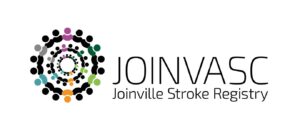Stroke is a leading cause of death and disability. In developing countries, patients often have their needs unmet because of fragmentation of care provision, lack of data ascertainment, and unfamiliarity of providers, patients, and managers with cost-effective treatment strategies such as stroke units and thrombolysis and thrombectomy.
Joinvasc is a stroke care program implemented at Joinville (Southern Brazil, 597,658 inhabitants) to improve stroke prevention and outcomes for the whole city. The initiative started in 1995 with systematic data collection, coupled with creating a stroke unit in 1997. Currently, Joinvasc comprises a stroke unit (the project’s IPU), a Stroke Registry, public health care managers, the Association of patients, and university researchers.
According to the municipality’s protocol, all patients with suspected stroke or transient ischemic attack are transported by ambulance to the reference stroke unit at HSJ and receive acute treatment, including, whenever possible, reperfusion therapies (thrombolysis, thrombectomy). Early care and rehabilitation occur within the hospital by a specialized multidisciplinary team. Long-term care is individualized, patients are discharged with an established treatment plan, and dedicated staff follows the patient to assure that their needs are met.
The cycle of care was developed over 25 years incrementally using real-world data that indicated gaps and opportunities to improve patients’ value in health, from prevention to rehabilitation. Joinvasc has created partnerships with managers and health workers in all care levels, providing data-driven inputs for improvements. Patients’ and family members’ interests were further integrated into the care cycle through “ABAVC”, a patient advocate organization.
Data collection is population-based and continuous since 2009, including clinical and epidemiological data, patient-reported outcomes, radiological and genetic information for the full cycle of care (up to 5 years after stroke). Direct, indirect, and social costs are collected for the full cycles of care, creating one of the first real-world databases that allow the calculation of the economic burden of stroke in developing countries.
Brazil’s public healthcare system (SUS – Unified Health System) finances the care pathway and registry. All persons living in Joinville are entitled to the complete care pathway without out-of-pocket costs and participate in the registry irrespective of income, health insurance status, or place of stroke treatment.
Joinvasc’s main achievements:
-An increase in the volume of patients with stroke admitted to the core hospital (68% of Joinville’s stroke patients in 2009-2011 to 83% in 2018-2020)
-A 58% reduction in 30-days stroke lethality in the last 25 years (1995: 26%; 2005-2006: 21%; 2009-2011: 16%; 2018-2020: 11%);
-A 37% reduction in stroke incidence (143.7 per 100,000 inhabitants in 1995; 105 in 2005-2006; 90.9 in 2012-2013);
-A 49% increase in the proportion of patients with a functional improvement after a severe stroke, defined as ≥1 point gained in the 3-months Modified Rankin Scale (38% in 2010-2011; 44% in 2014-2015; 57% in 2018-2019).
Joinvasc’s stroke care experience has been used to create numerous scientific publications and has been taught to 24 centers in Latin America. It is a reference for Brazilian public stroke policies and is currently contributing to the World Stroke Organization’s Certification Program for Latin America.

